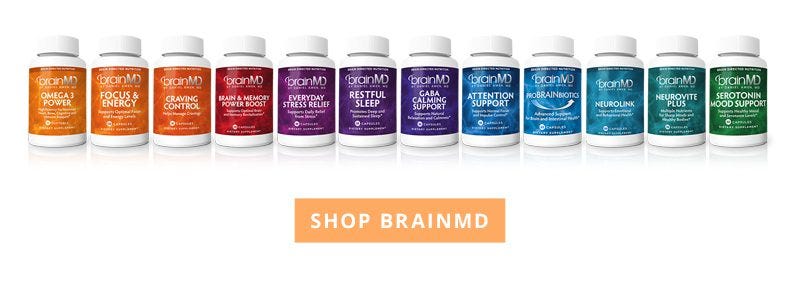The Top 10 Ways to Improve Your Emotional Well-being
How to Improve Emotional Health
According to the National Institutes of Mental Health – 51 percent of the U.S. population will suffer from a mental health issue at some point in their lives. Since people don’t want to be seen as different, foolish, or abnormal, fewer than half of those who suffer from mental health problems ever seek help.
Sadly, the issue of mental health remains shrouded by misconceptions and harmful stereotypes. If you’re one of the millions of people trying to overcome a mental health challenge, know that there’s hope for a lasting change.
If you’re ready to take steps to healthier habits and need help getting out of an emotional rut, here are 10 tips for living a brain healthy and happy life…
10 Ways to Improve Your Emotional Well-being
Take Care of #1
Like it or not, stress is a normal and unavoidable part of living. How you treat your body, and brain, may well determine your ability to function in an increasingly busy world. Taking care of yourself may require that you seek out additional help.
Get a Move On
Physical exercise is perhaps the single most important thing you can do to keep your brain healthy. Exercise can boost blood flow and other positive nutrients to the brain, increase your levels of dopamine and generate new brain cells that can help the brain self-regulate and calm down. Walking can help you clear your mind, decrease anxious thoughts, improve your mood and burn some calories all at the same time.
Find Support in Community
Having a strong community means that support is just a phone call, email or visit away. Spending time in a positive community of like-minded people is a wonderful way to boost your bliss hormones, such as oxytocin. To improve your emotional well-being, focus your energy on people who are positive and engage in healthy habits.
Get Quality Sleep
Good sleep is essential for optimal brain and body health. Sleep helps repair and renew all the cells in the body. It gives the brain a chance to wash away toxins that build up during the day. It’s recommended that you get 7-9 hours of sleep each night.
Know Your Numbers
Since you can’t change what you don’t measure, having important health numbers at optimal levels is critical to brain function. To help with emotional well-being, be sure to periodically check your:
- Body mass index (BMI) – as your weight goes up, your brain function can go down
- Blood pressure (BP) – as your BP goes up, it can damage blood vessels and negatively affect the functioning of your brain
- Other important health numbers that can affect your brain – testosterone level, C-Reactive Protein (CRP), thyroid functioning, vitamin D level, fasting blood sugar, and hemoglobin A1c (HbA1c)
Beware of Isolating
Though isolating yourself during tough times may feel like the safest option, closing yourself off from the world can actually aggravate your problems. Resist the urge to shut out the individuals who can offer you encouragement and support – friends, family and trusted community or religious leaders.
Learn to Relax
Practicing yoga and getting massages can do more than just improve your physical function. Clinical studies indicate that both are beneficial for improving mood and coping with stress. Massages can lower the stress hormone cortisol while increasing the neurotransmitters dopamine and serotonin. Yoga can increase brain GABA, reduce anxious feelings and improve overall mood.
Talk it Out
Many people aren’t comfortable talking about their feelings. But opening up about personal issues can have big benefits for those who deal with emotional challenges. Whether in a support group or with a therapist, talking it out can reduce your sense of helplessness and provide relief from your struggles.
Enjoy the Great Outdoors
Engaging in outdoor activities is important for everyone’s emotional well-being, especially for those who work a desk job. Whether you enjoy hiking, biking, horseback riding or just taking a walk with a friend, being outdoors has an overall positive effect on vitality. While enjoying the great outdoors, you’ll get the added benefit of natural sunlight. Daily exposure to appropriate levels (as little as 10 to 30 minutes a day) of direct sunlight can significantly boost vitamin D3 levels and help improve your mood.
Get Some Nutritional Support
Whether you find yourself having negative thoughts, or if you feel that your stress levels have nearly reached the breaking point, BrainMD offers a range of powerful supplements for mood and stress that can help turn your day around. These brain-directed supplements have been formulated with the highest quality ingredients that can help you feel calm, content, and able to manage stress or mental strain.
NeuroLink
BrainMD’s NeuroLink supports a diverse array of such key transmitters as adrenaline, dopamine, serotonin, GABA, and glutamate. NeuroLink provides an exclusive blend of nutrients that can help you maintain a positive mood, keep your focus, and deal with stressful challenges by helping your neurotransmitters stay in balance.
- 5-HTP– In the brain, 5-HTP is readily converted to serotonin to help maintain mental and emotional well-being, reduce anxious feelings, and promote calm and relaxation.
- GABA– This amino acid regulates excitability of nerve circuits in the brain and is considered the brain’s main calming neurotransmitter.
- Taurine– Taurine, an amino acid that helps stabilize our nerve cell electrical activity, is known to enhance GABA’s calming effects.
- Tyrosine– Tyrosine is required for the production of the neurotransmitter dopamine. Having sufficient tyrosine in the brain promotes mental clarity in dealing with stress.
Serotonin Mood Support
Our brain produces the naturally soothing neurotransmitter called serotonin. Serotonin plays many important roles in the brain’s biochemistry and is involved in maintaining healthy mood and promoting feelings of calmness. Serotonin Mood Support was developed to promote serotonin activity in the brain. This formula includes:
- Vitamin B6– Vitamin B6 is fundamental to healthy nerve function. It is an essential cofactor for enzymes that make serotonin and other key transmitters.
- Methylfolate– The pre-activated and most readily utilized form of the folate vitamin is methylfolate. Methylfolate is paired with methyl-vitamin B12 to help ensure the brain makes sufficient melatonin (our sleep hormone) and has the biochemical tools for renewing and maintaining its nearly 200 billion cells.
- Saffron– The world’s most expensive herb, saffron has a long history of traditional use for inducing happiness. Saffron has consistently improved mood in many clinical trials.
Lifestyle habits such as consuming smart carbohydrates in moderation and taking a dietary supplement like Serotonin Mood Support can work together to elevate mood and promote calm.
Adopting these brain healthy habits can help to improve your emotional well-being so that you can live life to the fullest.
For more information about NeuroLink, Serotonin Mood Support or our full catalog of brain healthy supplements, visit the online store at BrainMD.




